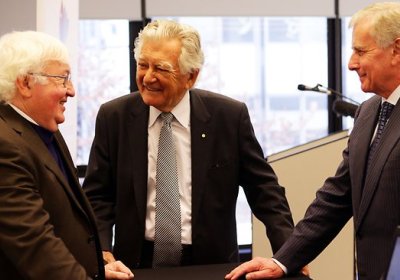Jonathan Strauss argues that a fighting, democratic union movement would entail members and delegates’ meetings directing industrial action and political campaigns, opposing state intervention and not subordinating union strategy to Labor’s pro-capitalist project.
Prices and Incomes Accord
Labor opposition leader Anthony Albanese has described himself as “more Hawke or Howard and less Shorten”. Holy shit, writes Pat O'Shane.
Sam Wainwright asks how would bosses, who are currently demanding that Fair Work Australia not raise award wages, react to a legislated freeze on the price they charge for goods and services.
The underlying gross domestic product trend shows the profit share is up to an historic high and the labour share is down. Since 1975, more than $4 trillion has been shifted from wages to profits. Paul Oboohov explains how it got to this.
Jonathan Strauss argues that organisation and unity will assist the struggle to create a different life to corporate Australia’s version of the “new normal”.
PM Scott Morrison wants unions and employers “to put down their weapons”, claiming this is the way jobs will be created. However, history shows otherwise, writes Mary Merkenich.
The JobMaker plan is an attempt to get us to accept a return to the neoliberal regime that made jobs precarious, ran down public services and made housing and education unaffordable, writes Peter Boyle.
Bob Hawke was instrumental in taming the Labor Party and the labour movement primarily through the introduction of the Prices and Incomes Accord, writes Jim McIlroy.
The historical and current injustices following the establishment of industry superannuation and the subsequent undermining of this important social policy initiative needs to be scrutinised.








